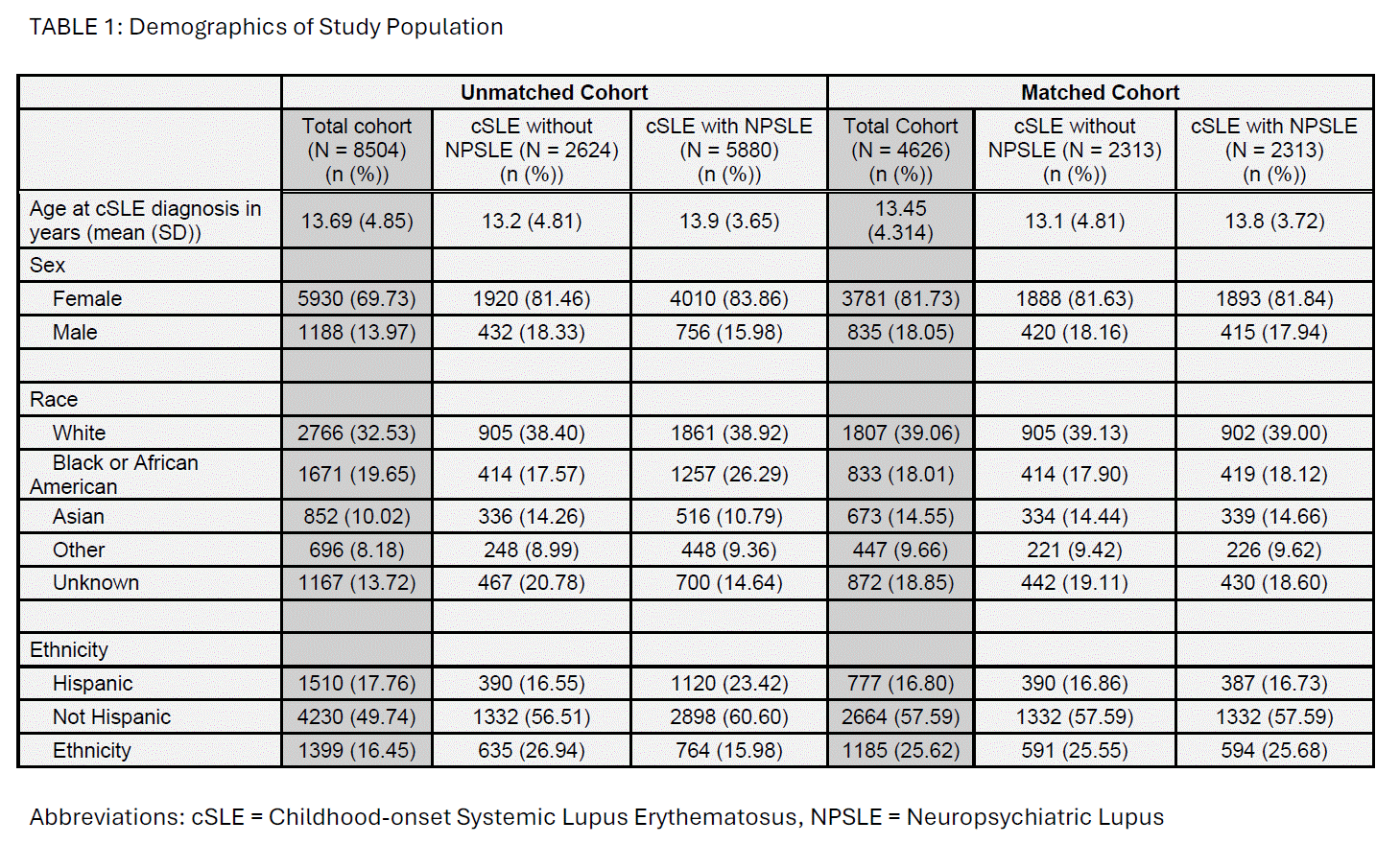Session Information
Session Type: Abstract Session
Session Time: 11:00AM-11:15AM
Background/Purpose: Childhood-onset Systemic Lupus Erythematosus (cSLE) affects approximately 1 in 10,000 children in the United States, with the estimated prevalence of childhood neuropsychiatric SLE (NPSLE) at 43 – 95%. Risk factors of NPSLE are poorly understood though NPSLE could severely impact cognitive development and long-term neurologic outcomes. Thus, identification of accurate predictors of increased NPSLE risk are greatly needed. The objective of our study was to understand whether premorbid mental health history predicted neuropsychiatric disease in cSLE. We hypothesized that mental health diagnoses and prescriptions occurring before cSLE diagnosis are predictive of future NPSLE.
Methods: Retrospective case-control study using a federated patient database (TriNetX Research network). We included patients aged ≤18 years at first SLE diagnosis between January 2014 and April 2025. We defined NPSLE using the 19 American College of Rheumatology classified neuropsychiatric syndromes with corresponding ICD-10 codes. Premorbid mental health diagnosis was defined as a neuropsychiatric diagnosis any time up to one day before initial SLE diagnosis using specific ICD-10 codes [(i.e. mood disorders (F30 – 39), depression (F32), anxiety disorders (F40 – 48; F41, F41.1, F41.9), adjustment disorders (F43.2) and attention deficit hyperactivity disorder (F90)]; and prescriptions using Veterans Affairs National Drug File (VA NDF) codes (CN300, CN301, CN302, CN309, CN400, CN600, CN601, CN609). The risk of NPSLE occurrence in relation to premorbid mental health diagnosis or prescription was analyzed over 2 time periods:(a)18-months and (b) total observation period, prior to SLE diagnosis. Propensity score matching was based on patient sex and race, and regression analyses conducted for the risk of NPSLE compared between cases and controls.
Results: The total TriNetX population queried included approximately 140 million patients from 102 healthcare organizations . A total of 8504 cSLE patients (5,880 cSLE patients with NPSLE and 2,624 without NPSLE) were identified. After propensity matching by sex, ethnicity, and race, 2,313 patients were included in each cohort (Table 1). Premorbid diagnosis of mood disorders, depression and anxiety disorders within 18 months prior to cSLE diagnosis were associated with > 2-fold risk of subsequent NPSLE (RR: 3.4, 3.6, 3.0; all p < 0.05. Similarly, the risk of developing NPSLE was increased with a diagnosis of mood disorders, depression, anxiety and attention-deficit hyperactivity disorder at any time point prior to cSLE diagnosis (RR: 2.9, 3.0, 3.0,2.1; all p < 0.05). History of use of anticonvulsant, antidepressants and sedatives within 18 months or at any time prior to cSLE diagnosis was also associated with increased risk of subsequent NPSLE. (Figures 1 & 2).
Conclusion: Preceding mental health diagnoses predict future neuropsychiatric disease in cSLE. Further research is needed to understand earlier clinical, laboratory and neuroimaging indicators of NPSLE development to delineate surveillance measures and interventions.
.gif) Figure 1: Risk of NPSLE occurrence in relation to premorbid mental health diagnosis or prescription any time prior to cSLE diagnosis
Figure 1: Risk of NPSLE occurrence in relation to premorbid mental health diagnosis or prescription any time prior to cSLE diagnosis
.gif) Figure 2: Risk of NPSLE occurrence in relation to premorbid mental health diagnosis or prescription within 18 months prior to cSLE diagnosis.
Figure 2: Risk of NPSLE occurrence in relation to premorbid mental health diagnosis or prescription within 18 months prior to cSLE diagnosis.
To cite this abstract in AMA style:
Ogbu E, Treutel C, Merritt A, Wagner M, Brunner H. Preceding Mental Health Diagnosis Does Predict Eventual Neuropsychiatric Disease in Childhood-Onset Systemic Lupus Erythematosus [abstract]. Arthritis Rheumatol. 2025; 77 (suppl 9). https://acrabstracts.org/abstract/preceding-mental-health-diagnosis-does-predict-eventual-neuropsychiatric-disease-in-childhood-onset-systemic-lupus-erythematosus/. Accessed .« Back to ACR Convergence 2025
ACR Meeting Abstracts - https://acrabstracts.org/abstract/preceding-mental-health-diagnosis-does-predict-eventual-neuropsychiatric-disease-in-childhood-onset-systemic-lupus-erythematosus/

